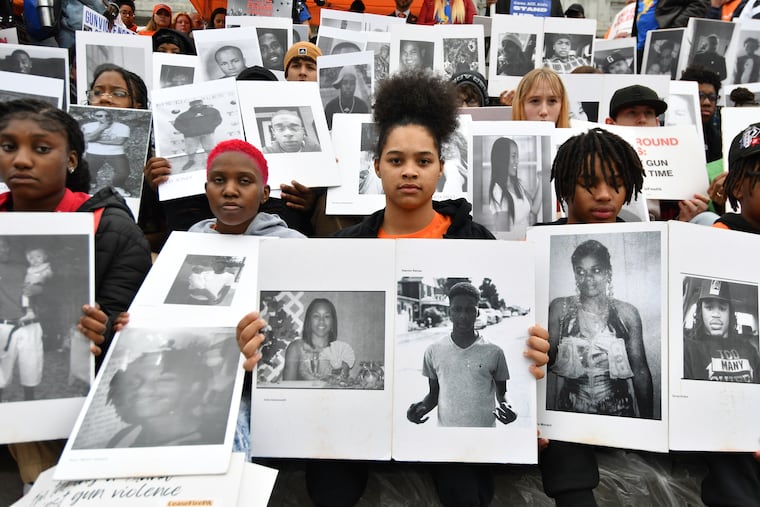Gun laws should reduce crime, not just infringe on constitutional rights
We all want to reduce crime and keep people safe. We shouldn’t waste time on ineffective laws that fail to reduce crime, yet burden vulnerable communities.

In the wake of recent inner-city crime waves, including Philadelphia’s record-setting homicide rates the last few years, Pennsylvanians were treated to accusations by Gov. Josh Shapiro, Mayor Jim Kenney, and other Democrats that their crime and violence problems are the fault of lawmakers in Harrisburg. We’ve also heard criticisms of legislative gridlock, standstill, and “failure to act” on so-called commonsense gun laws.
The way I see it, infringing on any constitutional right is not “common sense.”
The people of Pennsylvania went to great lengths to protect the right to bear arms in our constitution when they wrote, “The right of the citizens to bear arms in defense of themselves and the State shall not be questioned.”
At issue are two bills: one empowering authorities to remove guns from someone allegedly exhibiting signs (or “red flags”) they’re about to harm someone, and another requiring background checks for private transfers of firearms (misleadingly called a “gun show loophole”). Both bills have passed the Pennsylvania House, and are under consideration by the Senate Judiciary Committee.
I share the desire to have safer streets and fewer crimes. But law-abiding gun owners shouldn’t be punished for the offenses of criminals.
I share the desire to have safer streets and fewer crimes.
Instead, as with every gun control law (even if it could pass constitutional scrutiny), supporters have to show how a proposed gun law will 1) actually solve the problem, 2) cause more benefit than harm, and 3) be obeyed by criminals.
I understand the desire to prevent shootings before they occur. But when linking red flag laws to a reduction in suicides or violence, the evidence is inconclusive, while states that enact such laws barely use them. What’s more, these laws are vulnerable to subjective definitions and abuse by malicious actors. More importantly, red flag laws risk violating state and federal due process protections, including the Fifth, Sixth, and 14th Amendments, which ensure Americans receive fair treatment by the justice system. We cannot deprive Americans of fundamental rights, even when aiming to prevent violence.
Likewise, RAND Corp. analyses show that the link between background checks and the reduction of either mass shootings or total homicides is, at best, inconclusive. Most mass shooters obtain their firearms legally (often by passing background checks at licensed dealers), while most criminals simply steal or otherwise obtain guns illegally. For all we hear about gun show loopholes, only 0.8% of prisoners who used guns acquired them through actual gun shows. All of this suggests further restricting lawful transfers between citizens will do little to curtail criminal theft and black markets.
If weighed by their potential to solve gun violence, these laws fail entirely.
Now to the second question: Will these laws cause more benefit than harm? Well, in crime-plagued Philadelphia, applications for carry permits have skyrocketed, rising from around 11,000 in 2021 to over 70,000 in 2022 — an increase of more than 500%. According to reports, women comprise over half of new applications, with lawful firearms ownership also soaring among people of color. Consequently, incidents of self-defense are on the rise in Philadelphia.
Meanwhile, since taking office, Philadelphia District Attorney Larry Krasner has fired 31 prosecutors, reduced cash bail, released many criminals, and refused to prosecute many gun crimes, stating that focusing resources on arrests and convictions for illegal gun possession was not “a viable strategy.” His soft-on-crime behaviors have been criticized even by his own party. Meanwhile, law enforcement is suffering from staff shortages and retirements, prolonged 911 response times, and low morale.
Somehow, we are asked to believe that imposing costly new barriers on the ability of residents (including women and people of color) to protect themselves will reduce crime, but refusing to prosecute criminals will not.
» READ MORE: The growing ranks of Black gun owners | Jennifer Stefano
Because gun control makes it harder for people to defend themselves, these bills seem destined to worsen, not improve, the plight of our communities.
And finally, to question three: Can we get criminals to comply? This is always the hardest burden for gun control laws, which are only as good as compliance and enforcement. There’s nothing to suggest that a person intending to commit a crime will be deterred from doing so by either of these laws. Relying solely on signs, stickers, or statutes is not enough to deter lawless behavior.
If solutions are to be practical, effective, enforced, and not infringe on fundamental rights, these gun laws fail completely. We shouldn’t waste time on ineffective laws that burden vulnerable communities while leaving criminal behavior undeterred.
Instead, we must protect the right to self-defense, and not let misguided laws disarm law-abiding citizens. That begins with empowering victims, not criminals.
Cris Dush (R., 25th District) is chairman of the Pennsylvania Senate State Government Committee and chair of the new Senate Second Amendment Caucus.